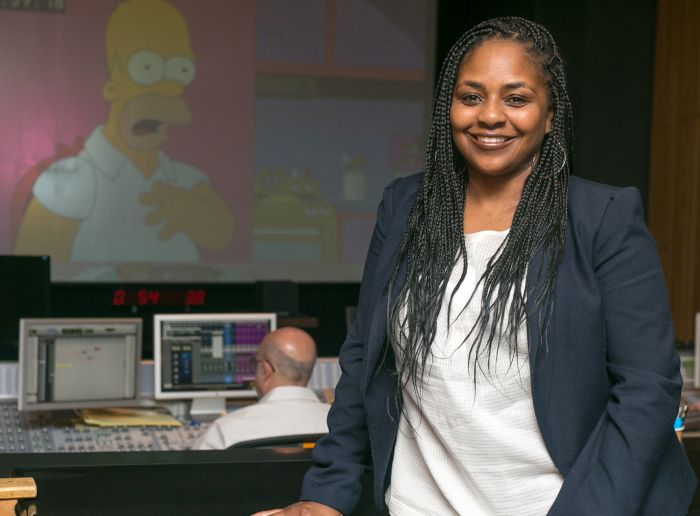
Dominique Braud sits in the back of a sound studio at Sony Pictures Studios in Culver City as the iconic voices of Bart Simpson and Sideshow Bob blare through the speakers. The same line is repeated several times as they become more in sync with the animation projected on a wall-sized monitor in front of the audio crew.
A post-production co-producer on “The Simpsons,” Braud and her team are working on this year’s Halloween special to get the audio “mix” just right.
“Each episode goes through several rewrites throughout the process,” says Braud. “They record it, then six weeks later it gets a pencil test,” which is a live-action sketch of the animation. “They’ll say, ‘That doesn’t work,’ and they rewrite it,” she adds. “Then it goes to the color stage, where it can get rewritten again. It’s always being changed until the end. Our mixing is the final stage of each episode.”
Braud (’97 B.A., interdisciplinary studies, television) began working on “The Simpsons” and for the Fox Broadcast Company 22 years ago while she was still a student at California State University, Dominguez Hills (CSUDH). At 26 years, “The Simpsons” is the longest running show in television history.
As co-producer, Braud works in-studio with a small team, mixing and balancing audio levels, music, sound effects and dialogue with the animation. She is also responsible for making sure all the music is legally cleared for use through Fox’s legal department.
A Foot in the Door
Braud became a production assistant (PA) on the show in 1993, beating out 10 others who applied for the position.
“I wanted to be an actress. At the time I had a small child and husband, but I wanted to get into the business really bad,” says Braud. “At the premiere of a low-budget movie I was working on for free, someone was there from Fox who said, ‘I heard you worked on the movie. Send me your resume.’ I didn’t know what the position was for, but she set me up with an interview with The Simpsons.
Money can’t always be what drives you, particularly when you’re just starting out. -Dominique Braud
“In the interview I told the producers ‘Whatever you guys do, I want to learn it.’ I was really eager, so I got hired,” she adds. “It was happenstance. Sometimes you have to follow your intuition and dreams. Money can’t always be what drives you, particularly when you’re just starting out.”
Braud moved up to production coordinator in 1994 and started working directly with the voice actors of “The Simpsons;” seven “main cast” members produce more than 120 character voices. She eventually became a post supervisor in charge of the show’s video effects until she was promoted to co-producer, the highest level in post-production work.
“To hear all the sound effects, music and everything mixed together–and to be a part of that process–is great. I try to make sure [an episode’s audio] is all balanced out the way I believe our executive producer would like it to sound,” says Braud. “Another thing I like about the mix is watching our executive producer and seeing some of the decisions he makes. It always makes me think a little bit harder about how I mix the show. He’s a writer and looks at it a little differently.”
Braud and her team usually work on the audio mix on Monday and Tuesday before an episode airs the following Sunday.
Another task that Braud is responsible for is post-scheduling, which is making sure work is scheduled in-sync with when each episode will air. That can get “a little complicated,” Braud says, since each season’s 24 episodes are produced simultaneously when production begins on “The Simpsons” in September. It typically takes nine months to produce one episode, according to Braud.
“The press needs [the Halloween special] so we’re doing it early, and I have to make sure everyone has it done in time to be delivered,” she says. “Each season we hold over four shows that will air the following season. So we have shows that have been worked on for over a year. This Halloween show was a hold over.”
Braud learned essential skills for her craft while taking classes in CSUDH’s Digital Media Arts program. As her professional career began to take off, she found the university to be flexible to her changing academic needs.
“The TV production program at Dominguez Hills was great because I learned how to produce videos and the industry terms that were helpful when using the equipment on the show. But at one point I wondered if I should drop out of school to take this job [‘The Simpsons’],” she says. ”I didn’t want to drop out because nobody in my family had graduated before me. I also had a small child, so I knew I had to graduate. The Interdisciplinary Studies Program enabled me to go to school in the evenings and on weekends. So I still got the foundation for television production that I needed.”
As “The Simpsons” approaches 30 years on television, Braud is contemplating her future in the industry. An entrepreneur at heart, she will be re-launching a successful T-shirt brand called “Fahari” that she had put on hold due to her busy schedule. She also buys and sells homes in Atlanta, a business she plans to expand, and is looking forward to exploring her passion for street photography.
“I’m still not sure if I want to stay in television after the show ends,” she says. “It’s a long part of my life. I can’t see myself working with a whole new team of people when I have been working with these guys for 22 years. It’s kind of like a marriage in that way.”